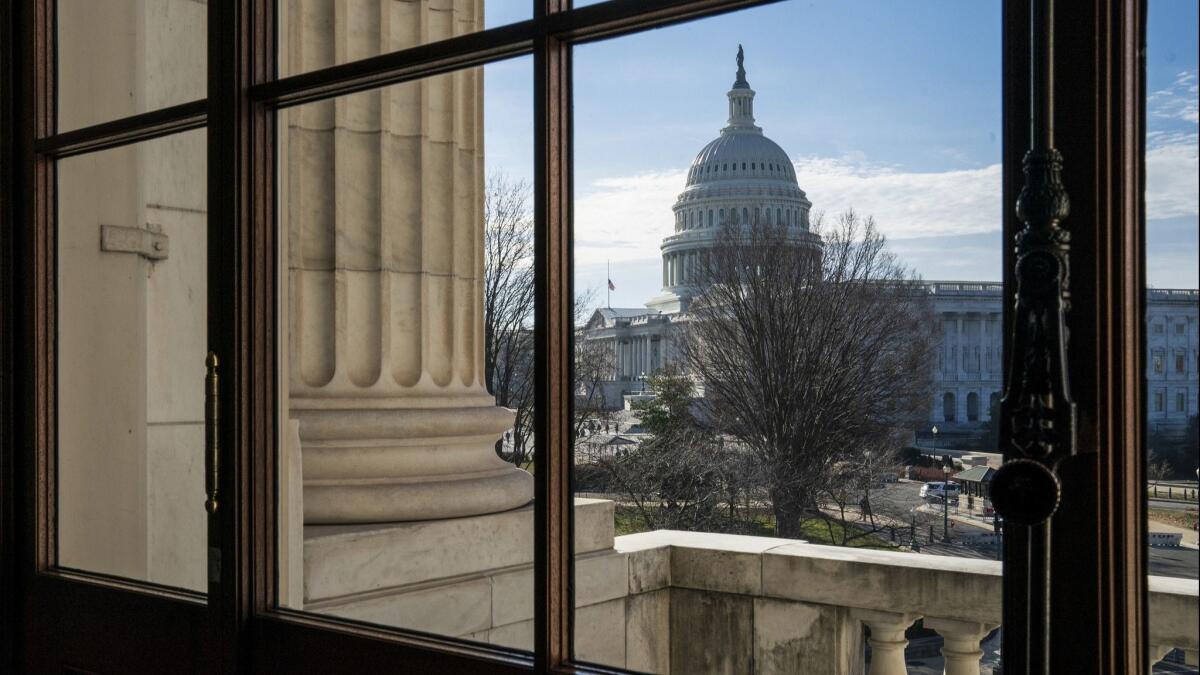Op-Ed: A balanced budget amendment would bring on more and worse shutdowns

- Share via
The 35-day partial government shutdown that cost the U.S. economy $11 billion can teach us something about our political process’ limits in problem-solving. These lessons are particularly important because a new effort to add a balanced-budget amendment to the U.S. Constitution could make damaging government shutdowns more frequent and harder to solve.
Around the country, well-funded groups are making a concerted push to get state resolutions passed that call for a constitutional convention to propose a federal balanced-budget amendment. With the aid of fuzzy math, some balanced-budget advocates claim to be just six states short, one state short, or even already to have surpassed the 34 resolutions required under Article V of the Constitution.
In Washington, too, proposals for a balanced-budget amendment will likely resurface now. Congress will be beginning work on next year’s budget even while many of the current year’s appropriations bills remain unresolved. In years when no budget-busting upper-income tax cut is politically possible, Republicans cite the very deficits their tax policies have created as justification for a balanced-budget amendment. Nervous Democrats often feel they must go along: At the state and federal level, voting for a balanced-budget amendment is easy: It looks fiscally prudent and puts off the hard choices.
An amendment that forced fiscal responsibility in Washington may sound good, but we have just seen the kind of havoc it would wreak in practice.
The Trump shutdown gives us an idea of just how disastrous a constitutional balanced-budget amendment would be. The president and Congress couldn’t agree on a spending bill to fund the government because of a single issue — the border wall — that was more about politics than budget give and take. Imagine how difficult it would be to reach an agreement on the right way to close large fiscal gaps when funding for every government function is on the table. Long impasses and shutdowns would be almost guaranteed, year in, year out.
If, say, the nation’s economy was slipping toward recession, with the deficit rising as tax revenues fell and spending rose for unemployment compensation and food aid, the battle might look like this:
One faction demands steep cuts in Social Security, Medicare and Medicaid, which constitute the majority of federal spending, no matter the promises made to recipients and future recipients. Another group targets the Pentagon, even though defense cuts might not produce what the balanced budget amendment required: immediate deficit reduction (weapons procurement involves long-term contracts). And if defense plants did start mass layoffs in response to such cuts, the teetering economy would take a further hit.
Yet another faction might seek to eliminate the deficit through tax increases on the affluent. Because Congress has approved a long series of upper-income and corporate federal tax cuts culminating in the nearly $2-trillion 2017 tax cut law, this approach could increase revenues from those at the very top of the income scale without exceeding historical levels of taxation. But the Republican Party has firmly committed itself to opposing such tax increases. Any GOP senator or representative voting for this as a way to balance the budget could expect a well-funded primary challenger.
Enter the Fray: First takes on the news of the minute »
A final, pragmatic group could try to get Congress to suspend the requirement to balance the books so that Washington could avoid further weakening the economy. But Democrats and Republicans alike would fear supporting such a proposal, because they could be seen as voting to “bust the budget.” Meanwhile, the advocates of entitlement cuts, downsizing the military or upper-income tax increases would resist suspending the amendment. The crisis created by a a balanced-budget requirement offers them leverage for their long-sought ends.
The result almost certainly would be a long and acrimonious impasse. The Trump shutdown had two obvious resolutions — either the president would give up getting $5.7 billion in border wall funding or congressional Democrats would provide it. But a shutdown triggered by a balanced-budget amendment would lack any such either/or solution. Each contending group would blame the others for the impasse and public sentiment would be fractured. The groups would fear compromise because it would infuriate their base voters.
An amendment that forced fiscal responsibility in Washington may sound good, but we have just seen the kind of havoc it would wreak in practice.
David A. Super is a law professor at Georgetown University.
Follow the Opinion section on Twitter @latimesopinionand Facebook
More to Read
A cure for the common opinion
Get thought-provoking perspectives with our weekly newsletter.
You may occasionally receive promotional content from the Los Angeles Times.










